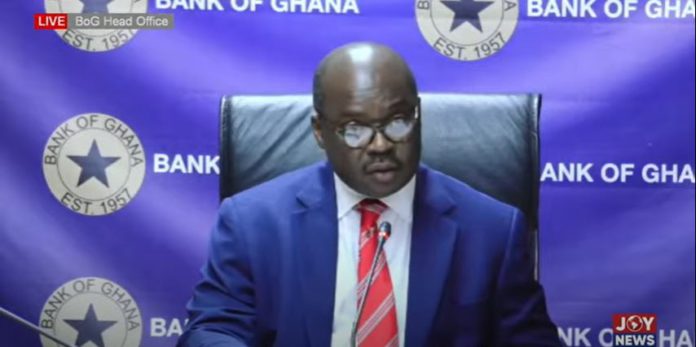The Governor of the Bank of Ghana (BoG), Dr. Ernest Addison, has said that the country’s monetary policies have responded positively to the International Monetary Fund (IMF) programme.
According to him, the results can be seen in inflation trending down, while there is stability in the exchange rate.
“Excluding the sharp depreciation of 20.6% in January [2023], the Ghana cedi cumulatively depreciated by 7.2% against the US dollar between February and December 2023”, he recalled at a press briefing after the Monetary Policy Committee meeting of the BoG.
He disclosed that the cedi has remained fairly stable against the US dollar over the past months.
“You cannot discount the impact of the IMF programme on its performance”, he stressed.
“At some point in time you want to ask yourself whether we are operating a fixed exchange rate , because the local currency has been fairly stabilise over a long time”, he added.
Concerns
The cedi ended 2023 with a depreciation of 27.8% compared to 30% the previous year. This resulted in some market analysts raising concerns about the impact of the IMF programme.
Dr. Addison expressed optimism that the local unit will continue to do well in the coming weeks, following fresh inflows from the IMF, as well as strong build up in its gold reserves.
“The cedi’s stability will be hinged on improved inflows from the IMF Economic Credit Facility (ECF) first tranche, the domestic gold purchase programme, remittances, and FX purchases from mining and oil companies, amid monetary policy tightening”.
Calls for larger reduction in Policy Rate
The Ghana National Chamber of Commerce and Industry had earlier called for a bigger reduction in the policy rate.
Data from the BoG shows showed that in December 2023, the pace of growth in the private sector credit slowed to 10.7%, compared with 31.8% annual growth in December 2022.
Responding to some concerns, Dr. Addison maintained that it is good to be strategic with policy rate reduction to check shocks to the private sector.
“We are targeting inflation rate to end the year within the band of 13.0% to 17.0% and this cut is in line with that”, he said.
Banking Sector performance and proposed recapitalization
The Governor also disclosed that commercial banks are in the strong position to recapitalize way before the 2026 deadline.
“As at end-2023, the data shows that the banking sector remains stable, liquid, and profitable”, he assured.
“The latest stress tests indicates that the sector remains stable on the back of the on-going re-capitalization process by shareholders alongside support from the Ghana Financial Stability Fund”, he added.
Dr. Addison also touched on how profitability has improved for the sector from the loss position recorded in the 2022 audited accounts, reflecting sustained increases in net interest income and fees and commissions.
ALSO READ:

